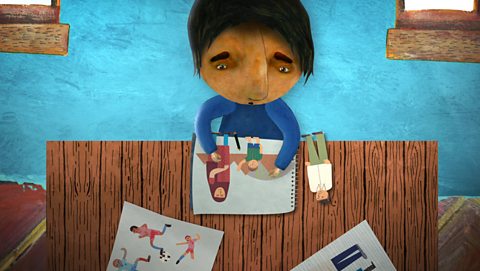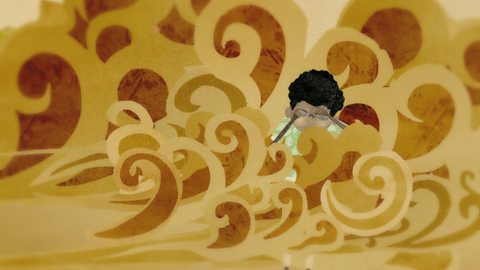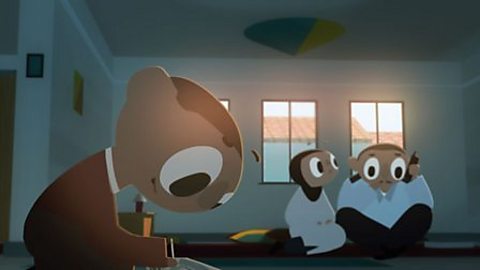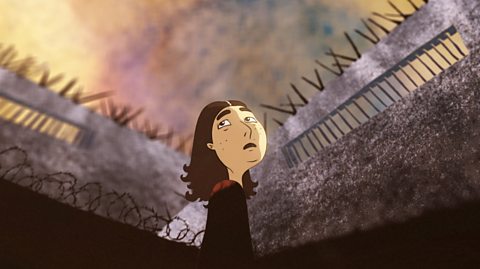JULIANE:
I was very young when my mum left me. I was three and a half. I don’t know why she left me, people trying to kill her or something. People from the church that we used to go to, um, took care of me and they brought me up.
I just learnt to be my own mother, my own father. I thought that I had no father or a mother but I knew that she was out there somewhere for me.
Like, you’d have, like, about 30 children eating from one plate and, like, it’s like a really big plate but you only have, like, a small amount of food, enough to feed, like, one person. And I didn’t have anything to eat for a week, the only thing I survived was water and that water wasn’t very clean. It had, like, snails and, like, all those dirty stuff inside it but you had no choice but to drink it.
Um, you would watch other kids yeah, walk past you, they’d laugh at you. And they’re like saying, “oh yeah you’re dumb”. Like, when other people are playing I’d just be sitting there by myself so that I’d be reading my book or I’d be just sitting there crying and looking at others.
Um, I left the orphanage and then I got put in this big massive dark lorry with like about 200 other people. And they started driving me away but because I was the little one I was like right at the, like, end, like close to the door.
And then I saw this lady, she had no shoes, all she was wearing was a pair of jogging bottoms and, like, a t-shirt, and she was running and she was screaming my name so I looked at her and I thought I remember that face. That was my mum.
I started crying, and I know it must sound, like, really strange, but I didn’t know how or where I got the power but I jumped from the back of the lorry onto her. And then me and her started holding each other, screaming. I could not believe it was surreal, like. And from that point on everything turned around in my life.
My mum, she went to the British embassy. And then… and then the people at the end ended up giving me a visa and we boarded the plane and then we arrived in Heathrow.
My first day at school, it was really tough. I mumbled, like, a lot because I was afraid to speak to people and, like, I often got anxious and get panic attacks. There comes a time where I’m just sitting there in class, right, I don’t even understand what’s going on.
There’s this, like, click in the back of my mind that says what if I get home and my mama’s not there. And, like, that’s the moment where, like, my heart starts pumping really fast, like, I start breathing really fast and then before you know it I just pass out.
In school they have created this, um, special group, like, whenever, like, I’m feeling angry, sad or anxious, I just go there and there’ll like always be, someone I could talk to, like, who I could tell what’s going on. And they would try and fix it like as much as possible.
nd I’m really improving on my socialising skills, but you know what, I’m a fighter and I’m a survivor, and I just want people to know that no matter how much you go through and no matter how much you suffer, you’re always going to be accepted for who you are. One day you’re going… you are going to be this, like, shining star, and at the end of every dark tunnel there’s always a rainbow.
Juliane is a 12-year-old girl who spent many years living in a Zimbabwean orphanage, separated from her mother. They were finally reunited and escaped together to the UK.
Juliane talks about her journey and how she still suffers from the effects of being separated from her mother at a young age.
She discuses the help and support that she received from her school to deal with these experiences.
This short film is part of BBC Teach's Seeking Refuge series. Click or tap here for the main page, with support notes for teachers.
Teacher Notes
This short film could be used to illustrate why some people have to flee their country, and therefore, help raise questions about persecution and war.
It could also be used to start a discussion around what it’s like for children adapting to life in the UK, identity and the effects of alienation and displacement they may experience.
In addition, in an English lesson this film could generate discussion for the different genres of writing, providing an example of narrative and describing personal experiences.
Questions to support discussion
- What was Juliane’s life like in the orphanage?
- Why did Juliane and her mum need to leave Zimbabwe?
- How does she describe how she felt at school in the UK?
- Why do you think Juliane felt like this?
- What helped Juliane?
- How did this help her?
- How would you describe Juliane as a person? Why?
Curriculum Notes
Relationships, sex and health education
Links to: The benefits of healthy relationships to mental wellbeing; how families contribute to human happiness; the characteristics of positive and healthy friendships; that happiness is being linked to being connected to others.
PSHE education (non-statutory)
Links to:
Core theme 1: Health and wellbeing/self-concept
Core theme 2: Relationships/Relationship values/Positive relationships
Core theme 3: Living in the Wider World/Communities
RE
Links will depend on the RE syllabus that a local authority, faith school or academy follows.

More from Seeking Refuge
Ali's journey from Afghanistan. video
Ali - a ten-year-old boy - fled to the UK with his grandmother during the war in Afghanistan. Ali describes the pain of separation from his family as well as his experiences adjusting to life in the UK.

Hamid's journey from Eritrea. video
Following the journey of ten-year-old Hamid from Eritrea, who was forced to leave his home country. Hamid candidly describes the struggles of settling into life in a new and unfamiliar country.

Navid's journey from Iran. video
With his father's life in danger, Navid - aged just five - was forced to flee his home in Iran with his mother and make the long journey to the UK.

Rachel's journey from a country in Eurasia. video
Following the journey of 17-year-old Rachel, who escaped religious persecution in her country and settled into a new life in the UK before being deported.
